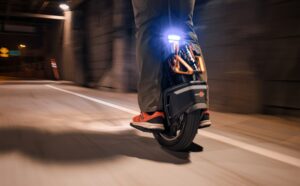
Electric Unicycles – Motorized Monowheels on the BIKE Paths?!!?

Electric unicycles?
You heard that right. Otherwise referred to as monowheels, these self-balancing, motorized unicycles are the new rage.
Now you may be thinking, I know what segways are. I’ve seen hoverboards and the one-wheeled skateboard. This “monowheel” is unlike those. Why?
First of all, the monowheel has no steering/physical handle to grab onto. All the steering comes from the footpads designed to have sensors that can detect the rider’s weight distribution.
There is no seat to sit on like a regular unicycle either. Unlike a one-wheeled electric skateboard, the monowheel has no standing deck for the rider to generally place their feet. The learning curve to operate this “vehicle” is much steeper than the traditional (loosely termed) electric skateboard. The balancing feature is derived only from the single wheel. The footpads use three contact points: the heel, the ball of the foot, and the toes to direct and maneuver the machine.
Are they safe?
Like any form of transportation, these electric unicycles come with their risks. It is always important to take precautionary and safety measures when riding. Wearing protective gear, paying attention to terrain conditions, and being alert to those around are crucial to maintaining your safety.
What happens if you get into an accident with an electric unicycle? Who is responsible? Is it covered under insurance?

Unlike an electric bicycle, which some insurance companies have coverage for, these electric unicycles do not fall under the same policy. Some companies have uninsured/underinsured motorist coverage with personal umbrella policies. However, it is not a guarantee that insurance will cover collisions involving electric unicycles unless it is in writing in the contract of coverage. Each insurance company is different and it is important to discuss with your agent what is and is not covered under your policies. Most likely, the rider of the electric unicycle will have to pay out of pocket for these collision expenses.
One may ask, why would someone commute to work with this type of vehicle?
There are many reasons why an individual may prefer riding on these types of vehicles. You do not need a parking spot. You can go on trails and pathways too small for cars. They are more “eco-conscious” than the standard gasoline-powered car. These monowheels are powered by electricity.
Another reason can be due to a revoked driving privilege. An individual may have lost their license because of a DUI, DWI, or too many tickets and points. This is sometimes the case when you see adults commuting by mini-bike or electric bicycle. To operate an electric unicycle, riders do not need to have a license. Just like a Class-1 E-Bike, Virginia does not recognize these monowheels as motorized vehicles permitted to ride on highway roads.
If you, or someone you know, has any questions regarding collisions with electric unicycles, monowheels, mini-bikes, or other nontraditional electric-powered or motorized vehicles, please do not hesitate to contact us at 703–796–9055, or email frontdesk@landaulawshop.com.
